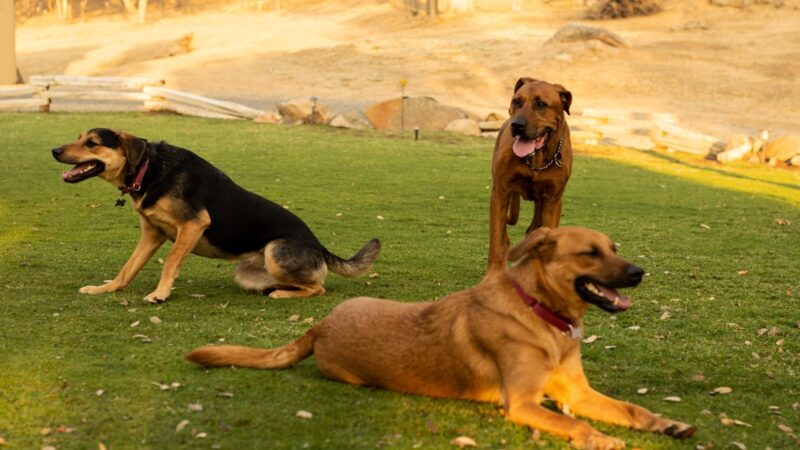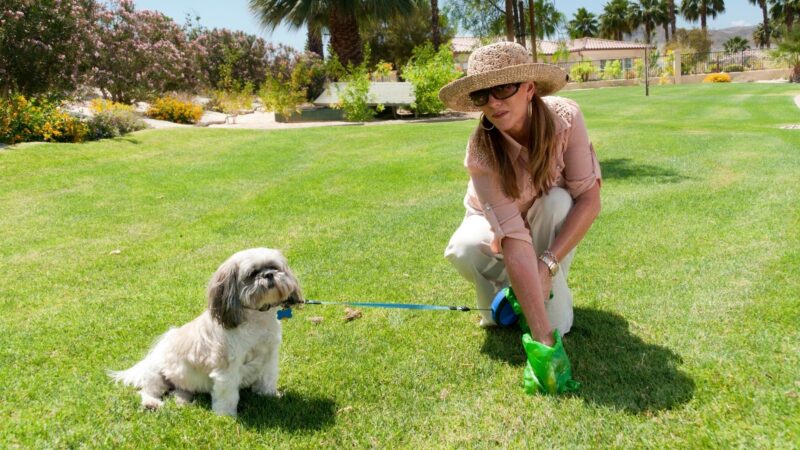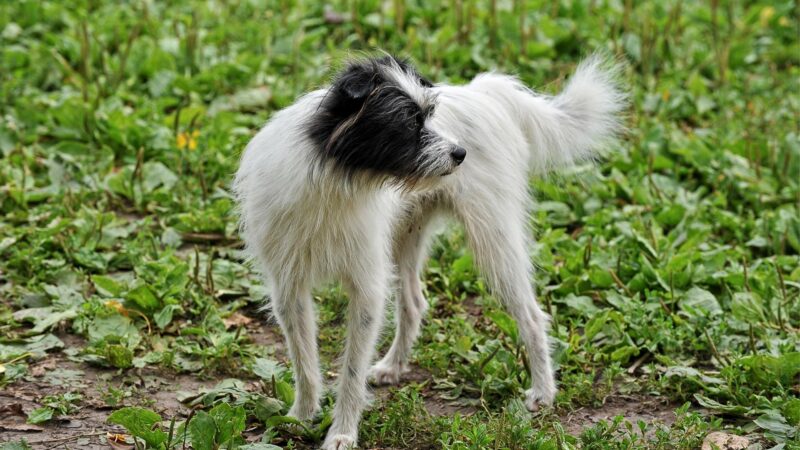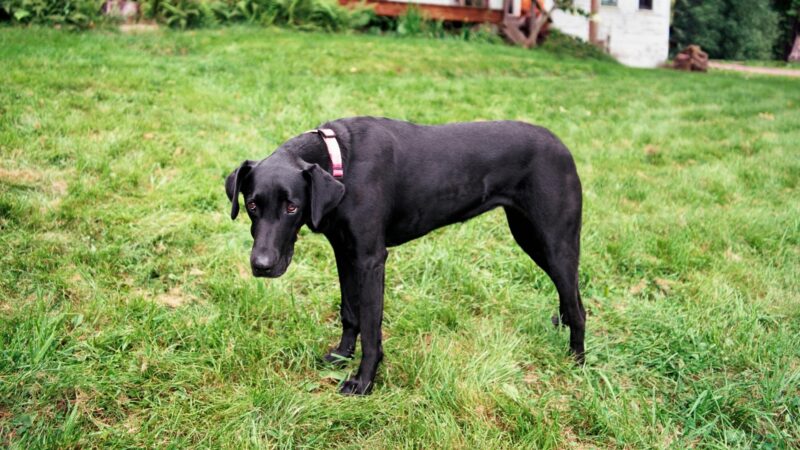Dogs are naturally man’s best friends, especially if you are their owners. But when the dogs are owned by other people, including your neighbors, they can be nuisances.
They may poop, pee, or leave some damage in your yard. In that case, you should take some action and prevent it from happening again.
How to keep your neighbor’s dog out of your yard? You should inform the owner of the dog politely. As much as possible, show him some proof so he cannot deny it. If he refuses to cooperate, you can file a complaint against him. At the same time, think of ways on how his dog can no longer enter your yard again.
Keeping your neighbor’s dog out of your yard is not an easy task. You should deal with both the dog and its owner. Although the dog is considered trespassing, some dog owners are more stubborn than their pets.
In this article, you will learn how to deal with your neighbors about their dogs without causing more problems.
Reasons Dogs Go Into Other People’s Yards

Whether a dog has an owner or it is a stray dog, it is very likely to go to other people’s property. This is because dogs are curious about their surroundings.
In fact, even well-behaved dogs do this if they feel there is a valid reason. Below are some reasons why dogs are interested in entering other people’s yards:
- To find a mate
- To search for food and water
- To find a comfortable place
- To play or dig the soil
- To chase other pets, especially cats and birds
What Attracts Neighbor’s Dogs in Your Yard?

Dogs are very smart pets, and they know their owner’s property very well. This is why they bark aloud once an intruder or stranger tries to enter. But sometimes, dogs are tempted to go to their neighbor’s yard.
If that yard happens to be yours, it means your neighbor’s dog is attracted to it. Here are some of those attractants:
1. Your Dogs
Dogs are attracted to other dogs, regardless if they are male or female. If you allow your dogs to be in your yard and your neighbor’s dog sees them, both of them will get curious about each other.
At some point, your dog will try to go outside, or your neighbor’s dog will enter your yard, especially if there is a way.
2. Your Dog Food
Dogs have a very strong sense of smell, especially when it comes to dog food. If you are feeding your dogs in your yard, your neighbor’s dog is very likely to smell it.
If there are some leftovers or the bowl is left in the yard for quite some time, the dogs from the outside will be attracted to it, regardless if they are hungry or not.
3. Dog Urine
Aside from food, dogs can also smell other dogs’ urine. Amazingly, they can also recognize their pee. Dogs pee not only to relieve themselves but also to communicate with other dogs.
This behavior is called urine marking, wherein dogs (mostly male) pee for several reasons, which include attracting a mate.
4. Your Plants
Dogs also love munching on plants, especially if they want to fill gaps in their diet. So, if your yard has some plants, don’t be surprised if your neighbor’s dog will be attracted to them. When dogs have an upset stomach, they may also eat plants and grass so they can vomit. This behavior is common to cats, too.
5. Standing Water
Dogs seem to always be thirsty. They may even drink more when the weather is hot or when they are very tired. But if a dog is excessively thirsty (also known as polydipsia), this could be a problem.
So, if you have a dog waterer full of water in your yard and your neighbor’s dog needs water, it may enter your yard soon.
Is It Legal for a Neighbor’s Dog to Poop in My Yard?

In most states, it is illegal for a dog to poop in other people’s yards. In the same manner, a neighbor’s dog that enters your yard without your permission may fall under trespassing.
If a dog poops or pee inside your property, the dog owner shall be held liable. If the dog has caused damage, the owner must pay for the repair.
Can a Neighbor Kill a Nuisance Dog in Their Yard?

A neighbor cannot kill a nuisance dog in their yard. Generally speaking, no one is legally allowed to intentionally harm or kill an animal unless in self-defense or the animal is attacking a person.
Laws on animal cruelty may vary in different states, but they also usually apply to pet owners who killed their dogs.
For example, the California Penal Code – PEN 597 states that a person who “maliciously and intentionally maims, mutilates, tortures, or wounds a living animal, or maliciously and intentionally kills an animal” can be charged with a felony. This is punishable by imprisonment or fine or both, depending on the court.
What Should I Not Do to Deal With a Neighbor’s Dog on My Lawn?

Finding a neighbor’s dog on your lawn can be very frustrating, especially if you saw it pooping, urinating, or causing damage. However, you should stay calm and don’t take matters into your own hands.
Otherwise, you might get into trouble with the law. To help you out, here are some things you should never do:
- Don’t harm or kill the dog. Much so, don’t shoot the owner.
- Don’t yell or quarrel with your neighbor.
- Don’t throw the poop back on the dog owner’s property.
- Don’t burn the dog poop in front of your neighbor’s house.
- Don’t mail or deliver the dog poop to its owner.
How Do I Confront a Neighbor Who Lets His Dog Poop on My Lawn?
First of all, you should not confront a neighbor who allowed his dog to poop on your property. Otherwise, it may turn out ugly and will cause more problems.
Instead, make sure first that it is your neighbor’s dog that poops in your yard. If you did not see the action with your own eyes, you may set up CCTV as evidence.
Tell the neighbor politely and show the video or photo of his dog while pooping in your yard. Explain to him the health issues that dog poop can cause to your family.
Ask him nicely to pick it up and not to allow his dog to do it again. If he does not want to remove the poop, remove it and clean the area thoroughly.
Most neighbors don’t know that their dog entered another yard to poop. But if you show them the evidence, they are very likely to cooperate.
If you cannot provide proof, ask your other neighbors if the same dog also poops on their lawn. But whatever your actions will be, always stay calm. After all, the law is on your side.
How Do I File a Complaint Against a Neighbor About His Dog?
First of all, filing a complaint against a neighbor about his dog should only be done if your neighbor is not cooperating with your request. In some cases, you can tolerate the occasional barking of your neighbor’s dog.
But if the dog becomes unbearable, you may talk directly to the owner. Again, you should do it politely.
If your neighbor seems to be uncooperative and his dog continues to cause annoyance or poop in your yard, you may now file a nuisance lawsuit against him.
But since this is not an emergency case, the police may not help you at once. Instead, contact your local animal control service first and show them the proof.
What Can You Do About Neighbors’ Dogs in Your Yard?
As mentioned earlier, there are several reasons why your neighbor’s dog will enter your yard. So, before taking any action, make a thorough observation of the dog and your yard.
Observe the dog’s activity very closely while it is in your yard. But more importantly, investigate how the dog was able to enter.
How to Stop Neighbors’ Dogs From Peeing in My Yard?
Dogs pee to send a message to other dogs. Aside from trying to attract a mate, dogs also pee to mark territory. In some cases, dogs with frequent passing of small amounts of urine can be a sign of having health issues.
One effective way to stop a neighbor’s dog from peeing in your yard is through dog repellents.
Effective Ways of Keeping Neighbor’s Dogs out of Your Yard
Now that you’ve learned why a neighbor’s dog will enter your yard and what to do next, you should also know how to prevent them from doing so.
Below are some of the humane ways to prevent your neighbor’s dogs from entering your property. Note that a combination of these strategies can produce great results faster.
1. Install a Fence
Dog fences can be made of wood, metal wire, or PVC. Normally, an average dog can jump to at least 4 feet high. You can make your dog fence for your yard using durable polypropylene mesh netting such as Feitore Deer Fence Netting . You will also need some metal stakes or pieces of wood for the fence posts.
- Size: Deer netting size 7 feet x 100 feet; garden netting mesh...
- Strong & Reusable: Tough deer fence barrier netting is made from...
- Safe & Economical: The 3/4 inch square mesh design of our deer...
- Easy to Install: Easy to use roll of anti bird deer protection...
- Enjoy Your Fruits: Don’t let birds, deer, dogs or other animals...
2. Minimize Attractions to Dogs
As mentioned above, your neighbor’s dogs are attracted to dog food, plants, and other dogs. If you have dogs, feed them inside your house. Also, don’t allow them to stay long in your yard, especially if there is a dog outside.
But if you allow your dogs or cats in your yard, make sure that you can supervise them closely.
3. Put a Sign
If you will put a sign reminding your neighbors not to allow their dogs to enter your property, make it simple and polite but direct to the point.
You may also add another sign in a spot near your property where pet owners can allow their dogs to do their business. In doing so, passersby with dogs will also know what to do.
4. Make Some Noise
If you spot an outsider dog trying to enter or has entered your property, you can create some noise that can shoo them away. This includes banging a pot with a metal, playing loud music suddenly, or screaming at the dog.
Dogs that have been startled by loud noise frequently will eventually be scared to come back.
5. Install a Motion-Activated Sprinkler
Unlike loud noise, motion-sensitive sprinklers can drive away your neighbor’s dog even if you are asleep or not around. With products such as Orbit Yard Enforcer Motion-Activated Sprinkler , your yard will be protected, night and day. It also works effectively against wild animals such as raccoons and skunks.
- SENSOR-ACTIVATED YARD SECURITY SPRINKLER - The heat and...
- DUAL-PURPOSE SPRINKLER - Our motion-activated sprinkler not only...
- ANIMAL REPELLENT OUTDOOR - Say goodbye to expensive fences and...
- TIMED WATERING FEATURE - Besides deterring animals, our sprinkler...
6. Use Dog Repellent Spray
Generally speaking, essential oils are toxic to dogs when ingested or spread into their skin. Most of these oils have strong scents that dogs hate, making them ideal dog repellents. Some dog repellent sprays, such as PetSafe SprayShield Animal Deterrent , contain citronella essential oil that can repel dogs effectively.
- SAFETY SPRAY: Unleash the power of the spray shield dog attack...
- CITRONELLA EFFECTIVENESS: Harness the effectiveness of citronella...
- COMPACT DESIGN: Appreciate the compact design of the citronella...
- IMPRESSIVE RANGE: Reap the benefits of the impressive spray...
- QUALITY ASSURANCE: Rely on the quality assurance of the PetSafe...
Note: Most dog repellent sprays and granules can effectively deter your neighbor’s dogs. But because they evaporate easily, you may need to spray repeatedly.
However, never spray them directly on dogs, regardless if they are outsider dogs or your pet dogs. Instead, spray them on areas where dogs should not stay.
Related: 7 Best Dog Repellents To Protect Your Family and Yard
Summary
Before taking legal action against stubborn dog owners, you should know your state laws. More importantly, you will need a lawyer. But because this can be expensive, try to settle the issue with your neighbor.
If you will talk to him very kindly, he will most likely cooperate. After all, having a pet dog is a responsibility.
List of Sources
Evans, P. (2018). Why Does My Dog Eat Grass? The Ohio State University.
Pet Poop Safety. (2020). Centers for Disease Control and Prevention.
Essential Oils and Pets. (2018). Oklahoma State University.
Confine your dog. (2022). Animal Welfare Victoria.
- How to Get Rid of Copperheads | Practical Guide - August 27, 2023
- How to Get Rid of Corn Snakes | What Makes Them Aggressive? - August 27, 2023
- How to Get Rid of Alligators | Safety Measures and Removal Methods - July 16, 2023



